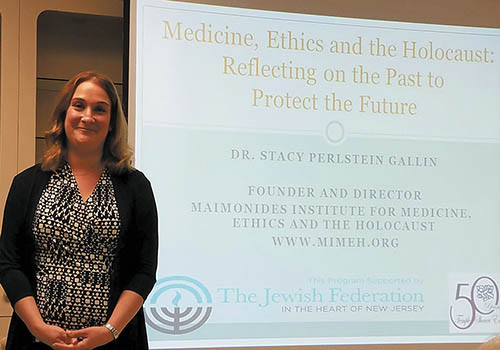

Yom HaShoah. A day to remember lives lost and saved. A day to honor heroes. A day to take time out of our busy lives to focus on the horrors and atrocities perpetrated by the Nazis in an effort to ensure the Holocaust never repeats itself.
Every year there are programs designed to keep the memory of the Shoah alive. Schools, synagogues, Jewish organizations and communities invite speakers—sometimes survivors—to tell their stories, or hold other types of events, each of which is intended to ensure that we never forget what happened during the darkest time in our history.
Sadly, the survivors are aging. By the time our grandchildren are adults, we will live in a world where there is no one who can share personal stories from the Holocaust. That is why it is vital that the younger generations get involved. There are lessons that must be learned for the sake of the future, not just of the Jewish people, but of the entire world.
Dr. Stacy Gallin, founder and director of the Maimonides Institute for Medicine, Ethics and the Holocaust (MIMEH), has devoted her professional life to ensuring that these lessons are learned, passed down and preserved for generations to come. She travels the country and the world giving lectures and presentations with a simple message. Never forget.
“Remember the past, protect the future,” said Gallin. “That is MIMEH’s motto.”
On Thursday, May 5, Gallin presented “Medicine, Ethics and the Holocaust: Reflecting on the Past to Protect the Future” before a multi-generational audience at Temple Shaari Emeth in Manalapan. Her focus was on the lessons to be learned from the medical atrocities of the Holocaust and the importance of teaching these lessons to future generations.
“I see a world that is beginning to forget and we cannot let that happen,” said Rabbi Melinda Panken, spiritual leader of Temple Shaari Emeth, in her opening remarks.
Sarah Portilla, the representative from the Jewish Federation in the Heart of New Jersey, which co-sponsored the program, spoke about the importance of supporting the survivors as they age.
“We need to let the survivors live out their lives with respect and dignity,” said Portilla.
Gallin continued the theme of dignity throughout her presentation. “The Holocaust is a unique example of medically sanctioned genocide,” she said, adding that “the medical community was involved in every single aspect of the abrogation of ethics that occurred during the Holocaust. It is vital that we explore the implications of these transgressions for modern scientific theory, medical practice, health care policy and human rights endeavors.”
Gallin’s presentation focused on the medicalization of social issues and the dehumanization of the Jews and other vulnerable populations. She argued that “the Holocaust remains the prime example of what happens when people forget that the dignity of the individual must be valued above all else.”
“Science determined who was worthy of living and who should die, and medicine then stepped in and carried out that death sentence,” stated Gallin. “Individual rights were subverted in favor of what was in the best interest of society.”
Today, Gallin said, advances in modern medicine, as well as bioethical discussions, keep the Holocaust’s atrocities relevant. “The Holocaust is not just a part of history. We must view it as a framework for understanding modern issues. How did people who took an oath to heal end up killing? Just because medicine has the ability to play God and extend human life or select certain genetic traits for our offspring, does that mean we should? Just because something is legal, does that make it ethical?” These are the questions, said Gallin, that MIMEH is committed to keeping at the forefront of modern medicine.
“We must ensure that the lives that were lost were not lost in vain,” she stated.
MIMEH was created to foster the development of a moral ethos within the medical community that emphasizes the necessity of putting individual human rights above all else. The goal of MIMEH, said Gallin, is to help keep the lessons of the Holocaust alive by making them relevant for future generations. This is done through the development of free webinars that are offered both live and on MIMEH’s website. MIMEH’s educational programming stresses that “science and ethics are not distinct entities. They coexist in the world. Physicians abandoned their responsibility during the Holocaust. It is our responsibility to remain vigilant in order to ensure that the horrors of the Holocaust are never repeated. In order to do this, we must engage future generations,” said Gallin.
“This topic is not just a Jewish issue. It is relevant for everyone because this is a ‘people’ issue,” she continued.
“You all chose to be here tonight,” she said to the audience, “ but how do we reach the others? If everyone goes home and shares one thing he learned with one person, and they pass it on, that’s how we continue to educate. We need the next generation to care and we need them to understand that it is their duty and their responsibility to keep these conversations going.”
For additional information, please contact Dr. Gallin at www.mimeh.org or [email protected].
To contact the Jewish Federation in the Heart of New Jersey, visit www.jewishheartnj.org.
By Jill Kirsch













